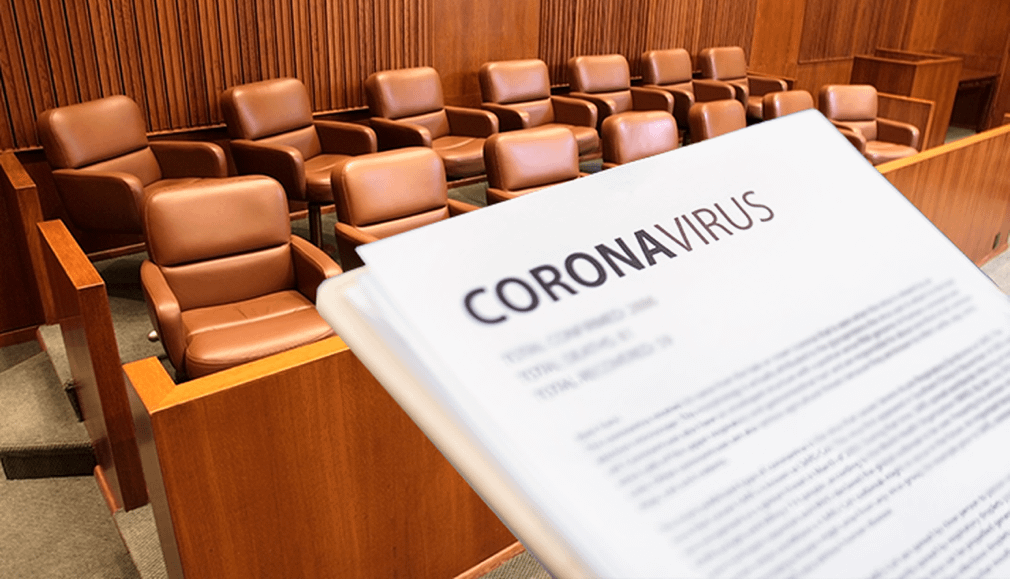Life has changed drastically for everyone since Michigan confirmed the first two cases of coronavirus (COVID-19) in the state on Mar. 10th. Businesses have shut down, with many people resorting to working from home (our attorneys and staff included) and many others finding themselves without jobs.
With now over 48,000 confirmed cases in the state and almost 5,000 deaths just in Michigan, the public health crisis is far from over. That’s why the state’s criminal justice system has implemented new guidelines to:
a.) mitigate the spread of the virus, and
b.) preserve individual’s rights to fair and equal representation.
Below, we have outlined the most significant changes to Michigan’s criminal justice system and crime data in general.
New Protocols Implemented in Michigan’s Prison System to Slow COVID-19 Spread
On Mar. 29th, two-and-a-half weeks after Michigan confirmed the first two cases of COVID-19, Gov. Whitmer signed Executive Order 2020-29, which aims to:
“protect vulnerable populations in Michigan’s county jails, local lockups and juvenile detention centers during the ongoing coronavirus (COVID-19) pandemic.”
The Executive Order details risk-reduction protocols, such as:
- Screening everyone who enters or leaves a facility, including staff, offenders and vendors.
- Restricting all visits, except for attorney-related visits.
- Limiting off-site appointments except for urgent or emergency medical treatment.
- Developing and implementing a protocol for incarcerated persons with COVID-19 symptoms.
- Providing appropriate personal protection equipment to all staff as recommended by the Center for Disease Control (CDC) to the fullest extent possible.
- Instituting stringent cleaning of all areas and surfaces on a regular and ongoing basis.
- Ensuring access to adequate personal-hygiene supplies.
- Practicing social distancing in all programs and classrooms.
- Minimizing crowding.
These protocols were adopted by the Michigan Department of Corrections (MDOC), while county jails and local lockups were only “strongly encouraged” to adopt these guidelines. However, the Executive Order did identify those who are potentially eligible for early release from jails or local lockups, including:
- inmates who are aging,
- those with chronic conditions,
- pregnant women or people nearing their release date, and
- anyone incarcerated for a traffic violation and failure to appear or failure to pay.
COVID-19 Cases in Michigan’s Prisons
- As of April 25th, over half of Michigan’s 29 prisons have at least one confirmed case of a prisoner with COVID-19, with an overall infection rate of 3%, or 1,178 positive cases among roughly 38,000 prisoners.
- Parnall Correctional Facility near Jackson — another hot spot, according to a Detroit Free Press analysis — is the 11th largest cluster nationwide, with 170 prisoners infected and 70 staff cases.
- Lakeland Correctional Facility in Coldwater, where 642 prisoners, or 44% of the population, and 31, or 11% of staff, have tested positive for the virus as of Friday evening — making it the facility with the most prisoner cases in Michigan.
Based on this startling data, Attorney Stephanie Achenbach stated that:
“It is obvious that our prisons will continue to have a rapid increase in COVID-19 infections and deaths. While testing all inmates is a logical first step, serious consideration needs to be given to reconsidering our sentencing laws to permit the early release of non-violent offenders.”
Restraining Order Expiration Dates are Extended
On Apr. 27th, Gov. Whitmer signed Executive Order 2020-63, which extends validity of existing personal protection orders (PPOs) that would otherwise expire during the continuing COVID-19 pandemic.
This coincides with a Michigan Supreme Court administrative order that extends PPO expiration dates until 90 days after Michigan’s emergency declaration is lifted. Therefore, law enforcement is required to extend the validity of PPOs to at least July 21, 2020.
Restricted Entry in Juvenile Justice and Substance Abuse Disorder Facilities
Executive Order 2020-37 details restrictions on entry into juvenile justice facilities and substance abuse disorder facilities, which requires facilities to use their best efforts to facilitate remote visitations between individuals under their care and their loved ones, using phone or video conferencing software.
The order also prohibits any visitors that:
- are not necessary for the provision of medical care,
- the support of activities of daily living, or
- the exercise of power of attorney or court-appointed guardianship for an individual under the facility’s care,
- are not a parent, foster parent, or guardian of an individual who is 21 years of age or under and who is under the facility’s care,
- are not visiting an individual under the facility’s care that is in serious or critical condition or in hospice care, and
- are not visiting under exigent circumstances or for the purpose of performing official governmental functions.
Originally signed on Mar. 14th, the order was initially set to expire on May 3rd. However, as COVID-19 remains a real threat in Michigan, these restrictions are now set to expire on May 31st at midnight.
Domestic Violence Calls Spike
Not everyone is safer at home.
Contacts to the Michigan Coalition to End Domestic and Sexual Violence, a statewide association for domestic violence shelters and services, has jumped to 393 this March and the first half of April, up from 189 from the same time last year. The state Domestic and Sexual Violence Prevention and Treatment Board, a government oversight agency, has also seen a surge in help requests.
Michigan’s spike in domestic violence calls is not unique to just the state. The head of the United Nations flagged the issue last week, calling for governments globally to make combatting the “horrifying global surge in domestic violence” a central part of their COVID-19 strategy.
Peace is not just the absence of war. Many women under lockdown for #COVID19 face violence where they should be safest: in their own homes.
Today I appeal for peace in homes around the world.
I urge all governments to put women’s safety first as they respond to the pandemic. pic.twitter.com/PjDUTrMb9v
— António Guterres (@antonioguterres) April 6, 2020
Under Michigan law, domestic violence is an assault (or assault and battery) by a:
- spouse
- former spouse
- person residing or having resided in the same household as the victim
- person having a child in common with the victim
- person with whom he/she has or has had a dating relationship
To find domestic violence resources and shelters near you, click here.
Decrease in (Some) Crime in Detroit
According to the Detroit News, Detroit police officials provided data from Mar. 16th – Apr. 26th that shows fewer people on the street has resulted in fewer crimes overall.
Detroit Police Chief James Craig, who was infected with the virus and was quarantined for two weeks before returning to his position, said:
“I’m very encouraged by the numbers, except those nagging shooting and homicide numbers. That carries over from the beginning of the year, when we saw an uptick in homicides and shootings.”
Non-fatal shootings have jumped 66% over the same period in 2019, and there has also been an increase from 21 homicides during that time-frame in 2019 to 26 this year.
Interestingly, while some law enforcement agencies and shelters are reporting an uptick in domestic violence since the shelter-in-place order was imposed, Detroit has seen a 12% drop since Mar. 16th, from 2,052 reports during that period last year to 1,796 in 2020.
Other significant drops include:
- Robberies (-20%),
- burglaries (-28%),
- sexual assaults (-40%), and
- aggravated assaults (-12%).
Jury Trials Postponed, Most Hearings Conducted Remotely
In response to the COVID-19 crisis, no jury trials in Michigan will take place until after June 22nd, according to Michigan Supreme Court Chief Justice Bridget McCormack’s administrative order.
Courts have already been operating at a reduced level since Mar. 16th. However, criminal hearings have been held for people who are in custody, as long as the defendant consented to holding it virtually.
While trials may have been placed on hold, pretrial, evidentiary and status hearings can be held remotely. Individual courts can begin holding jury trials later than June 22nd if they choose to.
The Takeaway
The COVID-19 pandemic has affected every business and institution across the world, and Michigan’s criminal justice system is no different. While Michigan continues to see noticeable decline in new cases and deaths, the state is in no way out of the woods yet.
During this time, it is especially important to find the balance between public health concerns and preserving everyone’s Constitutional Rights to fair and equal representation.



